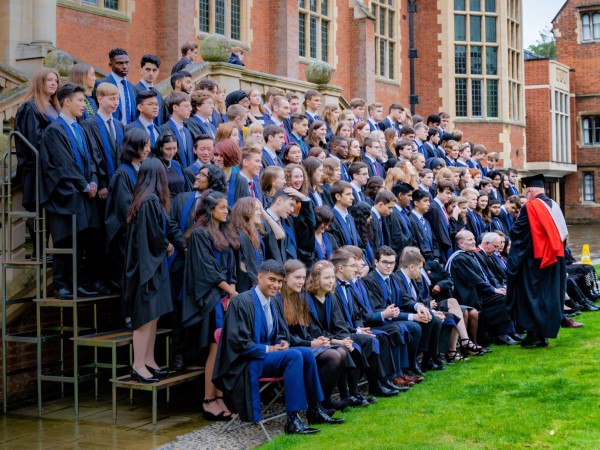
A new enhanced bursary scheme is being launched by the University of Cambridge to support undergraduate students facing financial pressures. Over the next ten years, more than £100 million will be awarded to students across all the colleges including Selwyn. The additional funding, to help with living costs, will enable students to enjoy the benefits a Cambridge education offers, regardless of their personal financial circumstances. Students will start benefiting from October 2021.
The new scheme is being made possible through the generosity of philanthropic donations from alumni and friends of the collegiate University. The Harding Challenge, established by David and Claudia Harding as part of their £100 million gift to Cambridge in February 2019, was designed to underpin this expansion in bursary provision. A number of donations to Selwyn have attracted matched funding from the Hardings.
Far more students will qualify for support since the threshold for eligibility will rise from the current maximum household income of £42,620 to £62,215. The University expects 25 – 30% of students will be eligible for the enhanced support (currently it’s around 20%). Once fully rolled out, around 700 students will also qualify for an additional £1,000 because they were eligible for free school meals.
UK students can apply to the Student Loans Company for a maintenance loan to cover basic living costs. There is widespread take-up of these loans: repayments are linked to future earnings which means they are more like a tax than conventional debt, and they are an invaluable support to making University more affordable for as many students as possible. However, research conducted by the University suggests many students struggle to meet all their expenses because parents often can’t afford to contribute to the extent that these means-tested loans assume they will. It’s these financial gaps that the new bursary scheme will help to alleviate.
Vice-Chancellor, Professor Stephen Toope, said:
“This new enhanced bursary scheme, which wouldn’t be possible without the generosity of donors, will help to ease some of our students' financial worries. The scheme’s launch means far more students will be eligible for support. This is particularly relevant now, at a time when many families’ incomes have been affected adversely by the Covid-19 pandemic.”
The launch of the enhanced bursary scheme follows a pilot scheme involving 20 colleges – including this one – and established and largely funded by Trinity College. Students in receipt of these bursaries said they were able to participate more fully in the academic and wider student activities Cambridge has to offer. The awards also had a positive impact on their mental well-being, reducing the anxieties they had about finances. Colleges also noted that there was a marked reduction in applications for hardship funding in-year.
Dr Mike Sewell, Senior Tutor of Selwyn College, said:
“The enhanced bursary scheme targets support at students from families whose income is less than £60,000 a year. This removes barriers to such students coming to Cambridge and helps them to participate fully in University life. It not only makes it easier for them to thrive while studying here, it also relieves their families of significant concerns.”
The University’s Faculty of Education has conducted research to find out how effective this level of support is for students. This found it contributes substantially to their wellbeing, participation in academic life and student societies, and overall student experience.
Under the new scheme, bursaries of up to £3,500 per year will be given to students from households with an assessed income of up to £62,215, without any application needed. Previously students were given support if the assessed income rose to £42,620. The bursary will be tapered so those at the lower end will receive more. For example, all undergraduates from households with assessed incomes below £25,000 will receive the full amount. Those at the top end will receive £100. The amount they receive is a grant and so is non-repayable. Awards will be further enhanced for students who join the University from local authority care or who are estranged from their families. In addition, the scheme will include a supplementary award of £1,000 per year to all low-income students who qualified for free school meals, contributing to a bursary of £4,500 in each year of their undergraduate studies.
The photograph shows students at a Selwyn matriculation in 2019.


